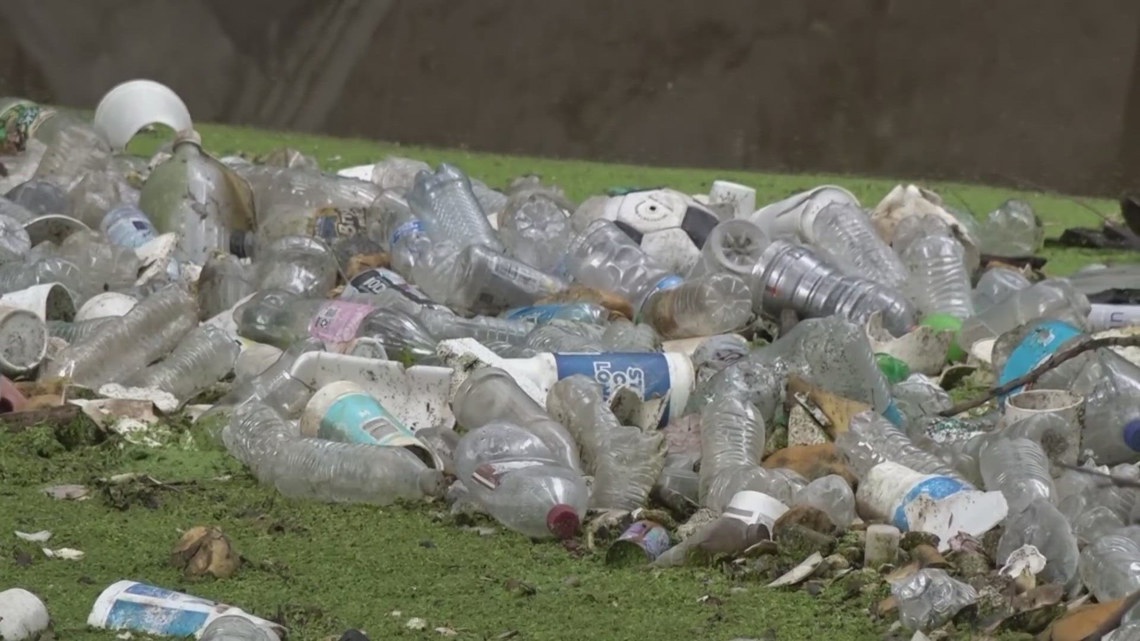
River Aid San Antonio works to clean Salado Creek, removing a massive trash island following record-breaking rains.
SAN ANTONIO — It’s dirty work but Isai, Ismael and Julian say they’re honored to do it.
The trio spent Thursday surrounded by muck as they worked to remove a huge trash island from the middle of Salado Creek in Martin Luther King Park in east-side San Antonio.
Dislodged by recent heavy rains and trapped by a litter collecting boom, the waste collected during this week’s downpour and it had to be removed quickly before the next rain event.
KENS 5 Weather Chief Bill Taylor confirmed Wednesday’s storm broke an 85-year-old record for most rain on May 28, with just over two inches being recorded.
The team, from River Aid San Antonio (RASA), is well adept at the work of taking out the trash as the innovative pilot project was launched last November.
“The first thing we see is a tire right next to a pool inflatable, really giving you an idea, especially against the backdrop of styrofoam and plastic about the diversity of trash these litter booms are catching for us,” said Charles Blank of RASA.
They’ve been analyzing the waste they remove to see if they can develop a way to reduce the trash at its source and keep the creek cleaner.
“This is really about data, these booms, and we’ve learned a lot . On this site alone we’ve audited 8000 pieces of trash,” said Blank.
48% of the material was plastic Blank said they were able to recycle but there is a lot of waste that can’t be repurposed.
“The really shocking thing is out of 8,000 pieces, 5,000 pieces were unrecyclable Styrofoam, broken into so many small pieces, so it’s really those single use items that are bogging down these booms and destroying our creeks,” Blank said.
Once it’s trapped by the boom, the litter is collected and sorted by hand.
Blank said the overwhelming amount of styrofoam they’ve recovered isn’t surprising but it’s something that needs to change.
“We’ve all been complicit. We’ve all gone to a gas station in our time and gotten that ice cold insulated styrofoam, but it’s a luxury we cannot afford with scenes like this and this data is telling us that in a shocking amplitude,” Blank said.
In addition to the boom effort, RASA sponsors regular volunteer efforts in watersheds all across Bexar County.
“We have cleanups almost every Saturday and if you follow us at at River Aid SA on Facebook or Instagram we post all those events so you can get involved with the litter booms, the cleanups, the water quality monitoring, the ecological restoration. There’s so many ways you can help our rivers,” Blank said.
Blank said volunteers of all ages are welcome to help with their collection efforts but children must be accompanied by a parent or guardian.
“We are working on finding a job for everyone who wants one, and you know volunteerism is important,” Blank said.
Blank said young volunteers are critically important.
“We know that this mission isn’t gonna be solved this week or at our next clean up and hopefully those little hands will become big hands that can get a real grasp around this problem after we’ve done the due diligence to continue to build our programming. It’s the next generation who’s gonna finish this mission,” Blank said.
Guidelines for helping are simple.
Blank said, “The only things we ask of any volunteers coming down is closed toed shoes, long sleeves are highly recommended as we’re in vegetation out here. And we ask that you bring a reusable water bottle. Please do not bring any single use products down to the cleanups, and other than that, a willing attitude.”
Additional partners in the boom joint venture are the city, the county and Osprey Initiative, the firm that developed the litter catching technology.
The pilot project is being sponsored by the Coca Cola Company and Coca-Cola Southwest Beverages.
